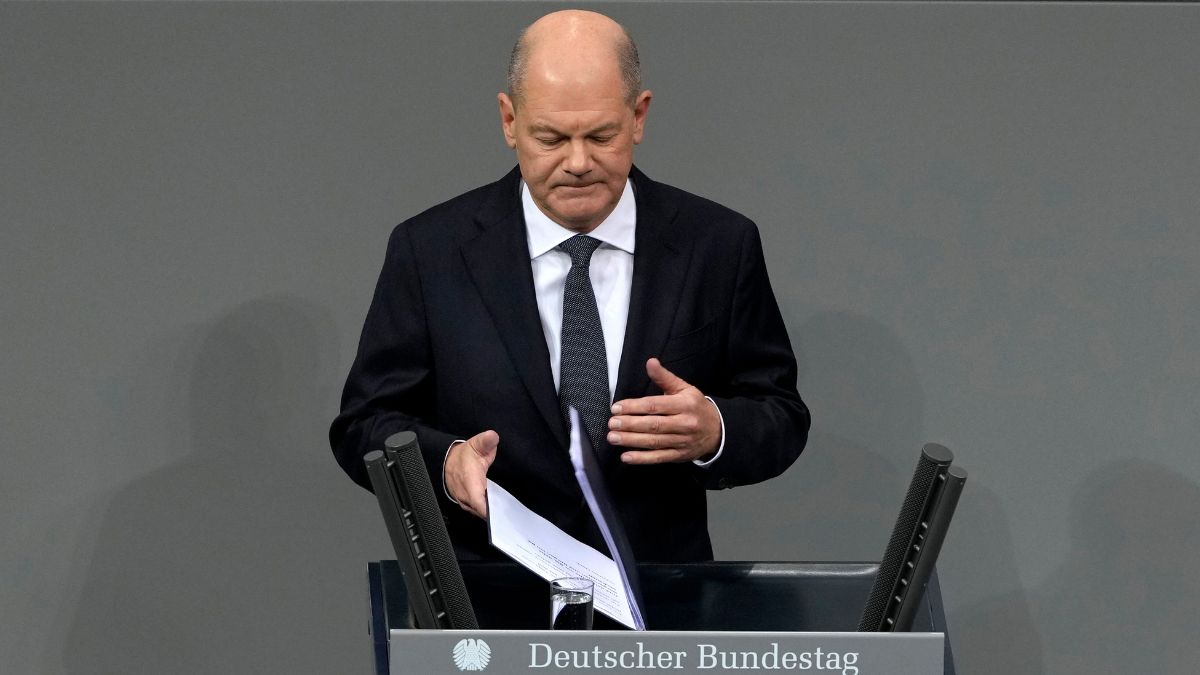Olaf Scholz has lost a historic vote of confidence in the German parliament.
What happens next?
The defeat has put Germany, the European Union’s most populous nation and largest economy, on track for an early election in February.
ALSO READ | Who is Friedrich Merz, Germany’s opposition leader who is gunning for Olaf Scholz’s job?
Scholz will now request that President Frank-Walter Steinmeier dissolve parliament and formally call for new elections, which must be held within 60 days, with 23 February currently earmarked as the date.
Why Olaf Scholz faced a no-confidence vote
The 2021 parliamentary election saw Scholz’s party, the Social Democratic Party (SPD), achieve its best result in two decades, securing 25.7% of the vote and emerging as the largest party for the first time since 2002. However, its coalition with the Greens, a fellow centre-left party, was insufficient to form an absolute majority.
The Free Democratic Party (FDP), an economically liberal party, gained ground in both the 2019 and 2021 elections, calling for a balanced budget and adherence to the constitutionally mandated debt brake. This set the stage for a “traffic light coalition,” named after the parties’ traditional colours.
Scholz’s three-party “traffic light” coalition collapsed in November when the pro-business FDP withdrew in protest after the chancellor dismissed Finance Minister Christian Lindner due to deep disagreements over debt management.
ALSO READ | Who is Christian Lindner, the finance minister at the centre of political crisis in Germany?
This move left Germany with a minority government consisting of Scholz’s SPD and the Greens, amid a period of severe economic challenges and geopolitical uncertainty. Within just 100 days of its term, political infighting took place, with the FDP clashing with its coalition partners on key legislative issues, including renewable energy, the debt brake policy, and changes to immigration laws, The Indian Express said in a report.
What happened during the vote?
The vote of confidence was required because Germany’s post-World War II constitution does not allow the Bundestag to dissolve itself. President Frank-Walter Steinmeier now faces the decision of whether to dissolve parliament and call for a new election.
Scholz secured the support of 207 lawmakers in the 733-seat Bundestag, while 394 voted against him and 116 abstained, leaving him well short of the 367 votes needed for a majority.
Steinmeier has 21 days to make his decision and, due to the timing of the election, is expected to do so after Christmas. Once parliament is dissolved, the election must be held within 60 days.
Scholz told lawmakers that the election would determine whether “we, as a strong country, dare to invest strongly in our future; do we have confidence in ourselves and our country, or do we put our future on the line? Do we risk our cohesion and our prosperity by delaying long-overdue investments?”
Scholz’s appeal to voters included promises to “modernise” Germany’s strict self-imposed debt rules, increase the national minimum wage, and reduce value-added tax on food.
In response, centre-right challenger Friedrich Merz criticised Scholz, stating, “You’re leaving the country in one of its biggest economic crises in postwar history.”
“You’re standing here and saying, business as usual, let’s run up debt at the expense of the younger generation, let’s spend money and … the word ‘competitiveness’ of the German economy didn’t come up once in the speech you gave today,” Merz added.
What happens next?
Scholz will remain in office as head of government until a new administration is formed. He has stated that if given a second term, he would prioritise investing heavily in Germany’s struggling infrastructure rather than implementing the spending cuts he claims conservatives would favour.
Germans will vote for seven major parties. The two dominant parties in German politics, the Christian Democrats (CDU) and the Christian Social Union (CSU), which are collectively known as the Union, form one grouping. The Social Democrats (SPD) form another.
Germany’s proportional representation system typically results in a coalition government, usually led by either the CDU/CSU or SPD. This time, the CDU/CSU will be led by Friedrich Merz, while the SPD will be headed by the incumbent and largely unpopular, Chancellor Scholz, CNN reported.
According to AP, Polls show Scholz’s SPD trailing far behind the Union bloc, led by Merz. Vice Chancellor Robert Habeck, from the environmentalist Greens, who are also part of Scholz’s government, is also eyeing the top job, though his party is currently behind in the polls.
Once the election concludes, weeks of coalition negotiations are expected to follow.
Confidence votes are rare in Germany, a country that values stability. This marks only the sixth time in the postwar era that a chancellor has called for one. The last instance was in 2005 when then-Chancellor Gerhard Schroder initiated an early election, narrowly won by Angela Merkel’s centre-right party.
ALSO READ | Why India is key to ending Germany’s over-reliance on China
Who is Friedrich Merz?
Initially seen as a transitional figure for the conservatives, Merz struggled in earlier leadership bids when Angela Merkel retired as party chair. He lost out in 2018 and 2021 before ultimately becoming party leader in 2022.
Merz’s campaign focuses on tax reductions, deregulation, and incentivising work. He has also suggested changing Germany’s constitutional debt cap to address public frustration with the country’s infrastructure, though he insists any changes would fund investment, not just expenditure.
A protege of Wolfgang Schauble, former finance minister and a leading figure in fiscal conservatism, Merz’s popularity grew as the CDU’s parliamentary leader in the early 2000s, before Merkel’s rise.
He left politics after her chancellorship and spent 15 years as a lobbyist and corporate board member, working with companies such as Blackrock and HSBC. Merz is also a hobby pilot and owns two aeroplanes.
With inputs from AP
)